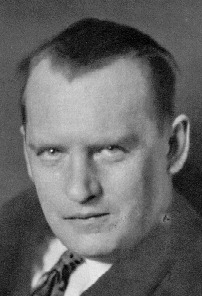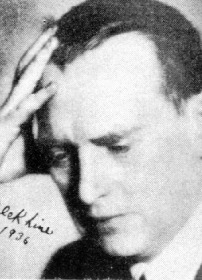All
the |
(Navigation bar
directly below.)
*******
© A.J. Goldsby, 2015.
(All rights reserved.)
****************
Click HERE
to see my
Chess Items.
****************
****************
Buy a book
from Amazon.com
(And help me out as well!)
****************
Click HERE
...
to see a list of the businesses that help to sponsor all of
my chess efforts.
Alexander Alekhine
|
|
 |
One of the greatest players who ever lived was Alexander Alekhine.
Many modern GM's have listed Alekhine as their favorite player, Garry Kasparov said that his style is a modern synthesis of many of the facets of this player's abilities and marvelous technique. (I.e., many modern GM's have said that they were inspired by the games of Alekhine and that Alekhine is considered to be one of the main influences in the "Russian" school of chess.) R. Fine said that only two or three players games were models of near perfect chess, and ones that all students should study. The three players that he recommended were Emanuel Lasker, Alexander Alekhine, and Bobby Fischer. (I would add that every aspiring student should also study at least 50 of J.R. Capablanca's best games, in my mind - and also in Irving Chernev's - Capa's games are the easiest for the average player to grasp.)
In 1925, the ever witty Tartakower wrote that: "Capablanca is the current World Champion, Lasker is the past champion, but Alekhine plays the way that a world champion ought to play!"
<< Alexander Alekhine was born in Moscow October 19th, 1892. His father was a Marshal of Nobility and a member of the Duma; and his mother was the daughter of a wealthy Moscow industrialist. Alekhine was taught to play chess by his mother and quickly developed a passion for the game. >> - Anne Sunnucks, "The Encyclopedia of Chess," St. Martin's press, (NY), published in 1970.
Many authors have written that Alekhine learned the game at a (relatively) late age, but this is totally false. The Alekhine home was a busy place where many activities went on, chess was just one aspect of their bustling social life. Since Alekhine's father, mother and older brother, (and possibly one uncle as well); all played chess, it is reasonably safe to assume that Alekhine was exposed to chess at a very early age. << The young Alexander learned to play chess at the age of seven. >> - (The Masters) "Alexander Alekhine, Master of Attack," by Alexander Raetsky & Maxim Chetverik. (Pg. # 7.) Published by Everyman Chess in 2004.
Alekhine's parents arranged for many masters to visit their home on a regular basis, and the young Alekhine soon was taking lessons from Dus Khotimirsky. By the age of ten, Alekhine was also playing many games of correspondence chess. Deemed too young to enroll earlier, Alekhine was finally accepted in the main chess club as a teenager. (Approximately age 12 or 13.) He played in his first "official" chess tournament at the age of 15. "Alekhine's talent was so striking that he was able to master the road from debutant to master within 18 months. This occurred in a secondary tournament of the Chess Congress in St. Petersburg in February, 1909. Alekhine won first prize with a score of 13 out of 16." - A. Raetsky and M. Chetverik.
Alekhine played in more tournaments, by tying for first in the All-Russian Championships, Alekhine was accepted into the great tournament of St. Petersburg, 1914. By qualifying for the finals, Alekhine became one of ... "The five ORIGINAL Grand-Masters of Chess." (The other four were Jose Capablanca, Emanuel Lasker, Siegbert Tarrasch and Frank J. Marshall.)
World events did not allow Alekhine to pursue chess alone, a revolution (October, 1917); in his native land and the First World War interrupted what might have been a steady progression of this player's march to the summit of chess.
<< In the summer of 1914, Alekhine was leading in the Manheim tournament when war broke out. The tournament was never finished. Alekhine was first interned, then released, and ended up serving in the Russian medical corps. Shell-shock put him in the hospital and he was later moved to Odessa. He was in Moscow when the Russian revolution overturned his country and his world. >> - "The Batsford Chess Encyclopedia," by Nathan Divinsky. Copyright to the author, published in 1990 by Batsford chess books. ISBN: # 0-7134-6214-0. (Hardback.)
In 1927, Alekhine finally got a shot at the title, and surprised the world by defeating the seemingly invincible Jose R. Capablanca in a long and grueling match. A WCS rematch between these two chess giants never occurred, Alekhine probably feared this possibility, and set great obstacles in the way to prevent it from ever happening. (He also set unreasonably high appearance fee's, and did everything possible to insure that he and Capablanca would not meet in a chess tournament - ever again. They finally played together again in the same tournament in Nottingham, 1936. Capa convincingly defeated Alekhine and played outstanding chess in this tournament ... Capa tied for first ... with Mikhail Botvinnik. For nearly 75 years, most historians agreed that Nottingham, 1936 was the best, greatest and the finest chess tournament ever played.)
During
the period of 1929 to 1934, Alekhine was virtually in a class by himself, he won
thirteen first prizes in international tournaments. Two of these events: San
Remo, 1930; and Bled, 1931; were two of the most amazing and dominating performances ever recorded. (I personally think that Bled, 1931 was one of the
grandest and best chess tournaments of all time. If a player today scored as
well as Alekhine did then, his performance rating would have to be near
3200!!!)
[My web page
on Bled, 1931.]
Alekhine lost "his" title to Max Euwe in 1935, but he won it back again in 1937. He also defended his title - twice - against Efwim Bogolyubov. Alekhine won at least 25 top-flight, international chess tournaments and he also won many matches as well. (<<He came in first in all but five of the 39 minor tournaments in which he competed.>> "The Oxford Companion to Chess," {2nd Edition} by David Hooper and Ken Whyld. Copyrighted to the authors, and published in 1992 by Oxford University Press.)
Alekhine's combinations were electric, his tactical ability was legendary. His feats in this area continue to delight chess players ... the world over. <<Alexander writes: ... "in playing through an Alekhine game, one suddenly meets a move which simply takes one's breath away. His games have a beauty and a fascination entirely of their own.">> - "The Batsford Encyclopedia of Chess."
His blindfold demonstrations were without peer and set world records. Only Morphy and Pillsbury played games of blindfold chess that can be compared to those of Alekhine's. (More on this subject later, I hope to have a whole web page devoted just to Alekhine's record-breaking blindfold, simultaneous displays. - Feb. 2007) According to one player, Alekhine had a phenomenal memory, and could remember and recite every chess game that he had ever studied.
His writings were some of the best of their time and remain models of clarity and analysis.
Alekhine's personal life was full of turmoil, his lifetime saw great social upheaval, the depression and both World Wars. (He also suffered from alcoholism as well.) He was accused of collaborating with the Nazi's during WWII and also writing anti-Semitic articles; and after the war, he was almost universally shunned. Although he was in negotiations with Botvinnik for a title match, he was in poor health and nearly broke. He died alone in a hotel room in Estoril, Portugal ... on March 24th, 1946. Sadly, he was only 53 years old.
<< His life was a tragic course, an uprooted noble Russian, who had to fear for his life several times - during two world wars and a bloody revolution. >> - Alex A. Aljechin (Alekhine's son) Forward, pg. x. "Alexander Alekhine's Chess Games, 1902 - 1946," by Leonard M. Skinner and Robert G.P. Veerhoeven. Copyrighted by the authors, and published in 1998 by McFarland and Company, Inc. ISBN: # 0-7864-0117-6 (Hardback, with library binding.)
Alekhine's Greatest Chess Games
Alekhine himself considered his two best games to be:
-
E. Bogolyubov - A. Alekhine; Hastings / 1922. [replay] [my analysis]
-
R. Reti - A. Alekhine; Baden-Baden / 1925. [replay] [my analysis]
*******************************
I
once asked GM
Raymond Keene, "What were Alekhine's five best chess
games?"
[See my post - on his page - of December 17th,
2006.]
Besides the two games - already mentioned above - the respected GM listed the following:
-
A. Alekhine - S. ; Kemeri, 1937. [replay]
(One of Alekhine's most brilliant games, the finish is extremely nice and picturesque. I have annotated most of this game, but I have not even begun the process of building the web page.) -
M. Euwe - A. Alekhine; 16th World Champ. Match; (Game # 4) / 10,10, 1935. [replay]
(A great ... a nearly unbelievable tactical struggle. However, I found severe flaws in this game, unfortunately - I never finished my detailed analysis ... let alone got around to building a web page for this game.) -
A. Alekhine - J.R. Capablanca; 13th World Championships (match) Buenos Aries, ARG; (Game # 32) / 22,11, 1927. [replay]
(GM R. Keene is not alone, I found several books that listed this as one of Alekhine's best games.)
*******************************
GM R. Fine - a player that I deeply respect - states that the following was Alekhine's best effort:
-
A. Alekhine - J.R. Capablanca; 13th World Championships (match) Buenos Aries, ARG; (Game # 34) / 11, 1927. [replay]
(Alekhine wins a Pawn, and then impressively converts his advantage. See R. Fine's book on "The World's Greatest Chess Games," for more details and Fine's superb annotations of this historic clash.)
*******************************
Also - several chess historians feel that the following pyrotechnical display was Alekhine's very best:
-
S. Tarrasch - A. Alekhine; / [E10] / Bad Pistyan, (R1) / 1922. [replay]
(I believe that this game also won a brilliancy prize as well. Another brilliant Alekhine party.)
Important links on Alexander Alekhine
[Alekhine's chess games.] [His Wikipedia entry.] [One quick bio.] [His Mecca entry & Bio.]
[His "Chess Metrics" page.] [My analysis of one of his greatest chess games.] [Bled, 1931.]
[A web page - on the subject of Alekhine's faked/altered games.]
[My analysis of Alekhine - Sterk; Budapest, (HUN) / 1921 ... on the WCA website.]
James O'Fee posts an interesting blog on Alekhine - his life, opponents, faked or altered games ... and more.
This page was first uploaded on: Monday; January 5th, 2007. Posted 01/10/2007. Page last edited: Saturday, January 24, 2015 03:48 PM .
[Home] [Site Map] [News page] [Annotated games, # 2] [Best players, Best Games, Best Tourneys.]
Copyright (©) A.J. Goldsby, 2015. All rights reserved.
